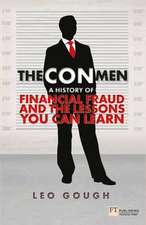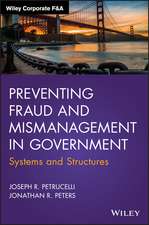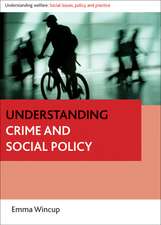Financial Crimes: Psychological, Technological, and Ethical Issues: International Library of Ethics, Law, and the New Medicine, cartea 68
Editat de Michel Dion, David Weisstub, Jean-Loup Richeten Limba Engleză Hardback – 16 iun 2016
| Toate formatele și edițiile | Preț | Express |
|---|---|---|
| Paperback (1) | 645.28 lei 6-8 săpt. | |
| Springer International Publishing – 31 mai 2018 | 645.28 lei 6-8 săpt. | |
| Hardback (1) | 651.67 lei 6-8 săpt. | |
| Springer International Publishing – 16 iun 2016 | 651.67 lei 6-8 săpt. |
Din seria International Library of Ethics, Law, and the New Medicine
- 5%
 Preț: 347.29 lei
Preț: 347.29 lei -
 Preț: 397.25 lei
Preț: 397.25 lei - 15%
 Preț: 635.31 lei
Preț: 635.31 lei - 18%
 Preț: 942.76 lei
Preț: 942.76 lei - 5%
 Preț: 718.65 lei
Preț: 718.65 lei - 15%
 Preț: 634.68 lei
Preț: 634.68 lei - 15%
 Preț: 637.78 lei
Preț: 637.78 lei -
 Preț: 380.07 lei
Preț: 380.07 lei - 18%
 Preț: 959.98 lei
Preț: 959.98 lei - 15%
 Preț: 641.20 lei
Preț: 641.20 lei - 18%
 Preț: 944.19 lei
Preț: 944.19 lei - 15%
 Preț: 636.80 lei
Preț: 636.80 lei - 15%
 Preț: 643.00 lei
Preț: 643.00 lei - 18%
 Preț: 952.89 lei
Preț: 952.89 lei - 15%
 Preț: 643.48 lei
Preț: 643.48 lei - 18%
 Preț: 954.45 lei
Preț: 954.45 lei - 5%
 Preț: 1095.73 lei
Preț: 1095.73 lei - 15%
 Preț: 645.79 lei
Preț: 645.79 lei - 18%
 Preț: 1111.22 lei
Preț: 1111.22 lei - 15%
 Preț: 643.84 lei
Preț: 643.84 lei - 18%
 Preț: 1227.67 lei
Preț: 1227.67 lei - 18%
 Preț: 953.65 lei
Preț: 953.65 lei - 15%
 Preț: 638.57 lei
Preț: 638.57 lei - 5%
 Preț: 1101.21 lei
Preț: 1101.21 lei
Preț: 651.67 lei
Preț vechi: 766.67 lei
-15% Nou
Puncte Express: 978
Preț estimativ în valută:
124.70€ • 130.52$ • 103.79£
124.70€ • 130.52$ • 103.79£
Carte tipărită la comandă
Livrare economică 31 martie-14 aprilie
Preluare comenzi: 021 569.72.76
Specificații
ISBN-13: 9783319324180
ISBN-10: 3319324187
Pagini: 437
Ilustrații: XIX, 376 p. 7 illus.
Dimensiuni: 155 x 235 x 22 mm
Greutate: 0.73 kg
Ediția:1st ed. 2016
Editura: Springer International Publishing
Colecția Springer
Seria International Library of Ethics, Law, and the New Medicine
Locul publicării:Cham, Switzerland
ISBN-10: 3319324187
Pagini: 437
Ilustrații: XIX, 376 p. 7 illus.
Dimensiuni: 155 x 235 x 22 mm
Greutate: 0.73 kg
Ediția:1st ed. 2016
Editura: Springer International Publishing
Colecția Springer
Seria International Library of Ethics, Law, and the New Medicine
Locul publicării:Cham, Switzerland
Cuprins
Table of Contents.- Introduction -Financial Crimes. Psychological, Technological, and Ethical Issues.- Financial crimes, its determinants and policy implications.- Chapter 1- Anti-Corruption Measures: The Panacea to a Financial Cliff (Andreas Kapardis, Maria Krambia-Kapardis and Nestor Courakis).- Chapter 2- The Determinants of Tax Evasion: A Cross-Country Study (Grant Richardson).- Chapter 3- What Determines Information Sharing for Income Tax Purposes: The Swedish Case (Jenny Ligthart, Barbara M. Sadaba and Rene van Stralen).- Chapter 4- The Duty of Financial Institutions to Investigate and Report Suspicions of Fraud, Financial Crime and Corruption (Fletcher Baldwin and Jeffrey A. Gadboys).- Psychological and Psychiatric Aspects of Financial Crimes.- Chapter 5- Forensic Psychiatric Contributions to Understanding Financial Crime (Sara Brady, Erick Rabin, Daniel Wu, Omar Sultan Haque, and Harold J. Bursztajn).- Chapter 6- Cognitive Factors to Financial Crime Victimization (Stacey Wood,Yaniv Hanoch, and George W. Woods).- Chapter 7- Personal and Situational Contributors to Fraud Victimization: Implications of a Four-Factor Model of Gullible Investing (Stephen Greenspan and George W. Woods).- Chapter 8- Villains, Victims and Bystanders in Financial Crime (Bruce Baer Arnold and Wendy Bonython).- Bribery, Corporate Governance and ethical aspect of financial crime.- Chapter 9- Complicity in Organizational Deviance: The Role of Internal and External Unethical Pressures (Anne Sachet-Milliat).- Chapter 10- Corporate Governance and Bribery: Evidence from the World Business Environment Survey (Xun Wu, Krishnan Chandramohan and Azad Singh Bali).- Chapter 11- Integrity in a Context of Institutionalized Corruption: A Theological-Ethical Clarification/Approach of a Complex Issue (Johan Verstraeten).- Chapter 12- Bribery and the Grey Areas of Morality (Michel Dion).- Tax Evasion, Money Laundering and technological aspect of financial crime.- Chapter 13- Applying evidence-based profiling to disaggregated fraud offenders (Andreas Kapardis and Maria Krambia-Kapardis).- Chapter 14- Globalization and the challenge of regulating transnational financial crimes (Nlerum S. Okogbule).- Chapter 15- The transnational organization of the drugs trade (Peter Enderwick).- Chapter 16- Money Laundering: The Challenges of Technology (Louis De Koker).- Chapter 17- New Technologies and Money Laundering Vulnerabilities (Jun Tang and Lishan Ai).- Concluding Remarks – Financial Crimes Research, Theoretical and Practical Implications.
Notă biografică
Michel Dion is Full Professor of business ethics at the Faculté d’administration, Université de Sherbrooke (Québec, Canada). He is the Chairholder of the CIBC Research Chair on Financial Integrity. His main fields of research include business ethics, corporate governance, and financial crime. His most recent book is: Financial Crime and Existential Philosophy (Springer, 2014).
David N. Weisstub (born 1944) is the Philippe Pinel professor of legal psychiatry and biomedical ethics at the Université de Montréal. He is the honorary life president of the International Academy of Law and Mental Health, and the editor-in-chief both of its International Journal of Law and Psychiatry and of Springer's International Library on Ethics, Law and the New Medicine. He sits on the editorial board of the Journal of Ethics in Mental Health. He has been made a Chevalier of the Légion d'honneur in France, a Knight of the Order of the Dutch Lion, and Grande Ufficiale in Italy.
Jean-Loup Richet. Since March 2013, Research Fellow at ESSEC Business School – Institute for Strategic Innovation & Services. Since June 2013, adjunct lecturer in Informations Systems at Sorbonne Graduate Business School (International MBA and MBA-MAE) and guest lecturer at HEC Paris (Crisis Communication) and Telecom Business School (Hacking and Information Security, Project Management, Risk and Crisis management).
David N. Weisstub (born 1944) is the Philippe Pinel professor of legal psychiatry and biomedical ethics at the Université de Montréal. He is the honorary life president of the International Academy of Law and Mental Health, and the editor-in-chief both of its International Journal of Law and Psychiatry and of Springer's International Library on Ethics, Law and the New Medicine. He sits on the editorial board of the Journal of Ethics in Mental Health. He has been made a Chevalier of the Légion d'honneur in France, a Knight of the Order of the Dutch Lion, and Grande Ufficiale in Italy.
Jean-Loup Richet. Since March 2013, Research Fellow at ESSEC Business School – Institute for Strategic Innovation & Services. Since June 2013, adjunct lecturer in Informations Systems at Sorbonne Graduate Business School (International MBA and MBA-MAE) and guest lecturer at HEC Paris (Crisis Communication) and Telecom Business School (Hacking and Information Security, Project Management, Risk and Crisis management).
Textul de pe ultima copertă
This book on the psychology of white collar criminals discusses various cases of financial crime, while also attempting to delve into the minds of the criminals in question. The literature on this topic is growing as it gains momentum in the scientific field, as a result of the extremely negative impact white collar crime has on its victims. Because there is considerable damage and vulnerability from these crimes, it is important to begin to classify them, and to understand the minds of those that commit these offenses. While the current literature is not extensive, this work provides a closer look into the various ethical and legal facets of financial crime, and helps to uncover the social, psychological and neurobiological factors that intersect in the minds of those criminals.
Caracteristici
Draws on the psychological and psychiatric aspects of financial crime Discusses ethical and legal issues involved in dealing with white collar criminality Brings together a group of top scholars on the much debated issue of financial crime Includes supplementary material: sn.pub/extras











